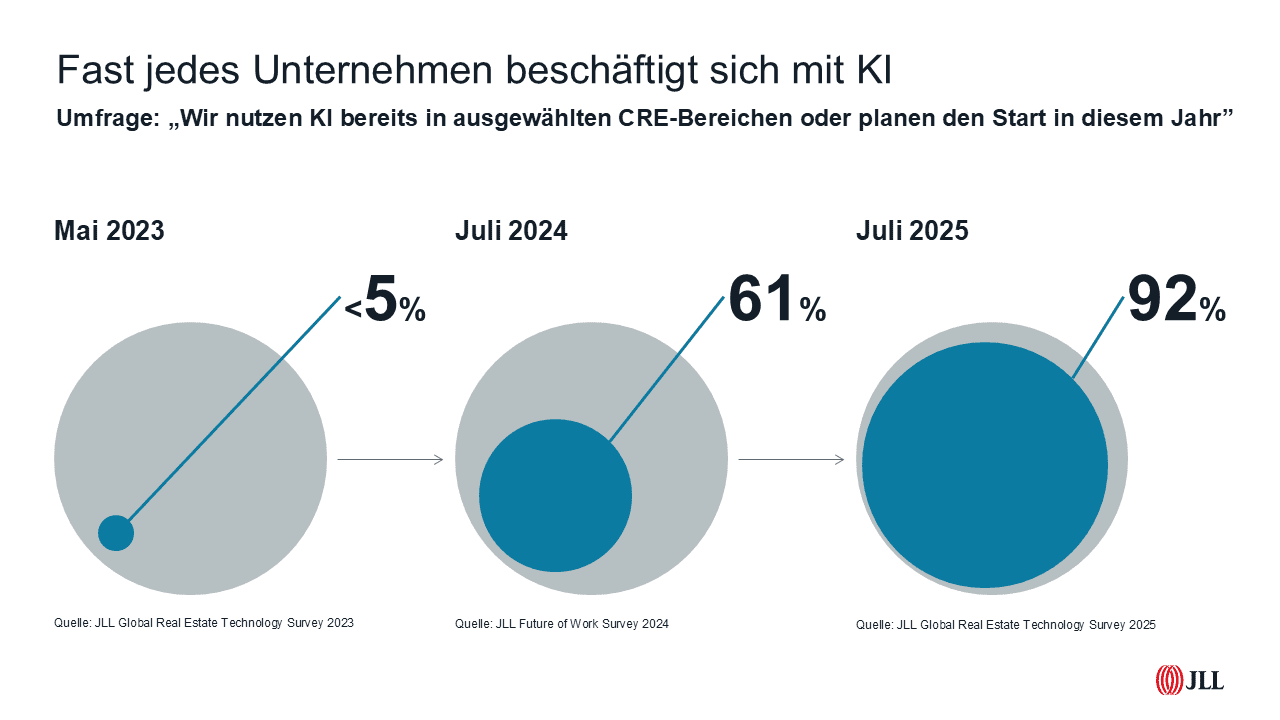JLL study shows rapid increase in pilot projects with artificial intelligence
Artificial intelligence (AI) is conquering the real estate world at record speed: While only five percent of the real estate decision-makers surveyed worldwide experimented with AI two years ago, 92 percent will have already implemented AI applications by 2025 or are planning to do so this year. In Germany, the rate is as high as 93 percent. This is shown by the current Global Real Estate Technology Survey 2025 by JLL, for which more than 1,000 managers responsible for corporate real estate management in 16 markets were surveyed, including 81 from Germany. In addition, around 500 real estate investors from 15 markets worldwide took part in the survey, 40 of them from Germany.
“The results illustrate the intensity with which the topic is treated in this country and how strongly awareness of the strategic importance of technological innovations is anchored in the market,” says Helge Scheunemann, Head of Research at JLL Germany.

The importance of AI in companies is also underpinned by their budget planning. The top five budget items are all AI-related: Strategic AI consulting, cybersecurity upgrades, digital infrastructure for AI, modernization of legacy systems, and AI pilots are at the top of the agenda. Most AI projects are aimed at data-based workflows, portfolio optimization and energy management. Less of a focus is on employee satisfaction, rental management and individual productivity gains. “With this prioritization, companies are following a strategic approach that focuses on business-relevant applications instead of quick wins on simple tasks,” says Scheunemann.
Despite the high level of commitment and clear prioritization, there is a clear gap between ambition and reality: Only five percent of respondents said they had already largely achieved their AI goals. Almost half of them say they are halfway there, a good quarter have reached a first partial goal and about a fifth have not yet achieved any successes at all.
The German survey participants see cyber and data protection requirements as the main hurdle in the introduction of AI applications, but the majority of investors do not feel sufficiently trained in the use of AI and almost one in two currently sees no clear advantages of AI to create a solid business basis. “The lack of skills, a lack of change management and inadequate governance for AI projects mean that many companies are unable to fully exploit the opportunities offered by the technology,” Scheunemann notes.
Budgets for technology projects grow significantly
Overall, companies are planning to increase their budget allocation for technology projects significantly. In the past two years, a good third have increased the corresponding budgets by up to six percent, this year it was already one in two. For the next three years, around 80 percent of the decision-makers surveyed expect an increase of this magnitude.
According to Scheunemann, the real estate industry is at the beginning of a fundamental transformation through AI that is comparable to the industrial or digital revolutions of past decades. “Companies must act now and systematically invest in AI to secure a competitive advantage in the long term. The next wave of competitive differentiation will take place through tailor-made technological solutions. If you don’t act now, you risk losing touch.”



